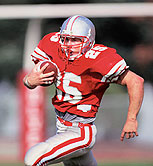
WEDNESDAY, June 1 (HealthDay News) — Screening college athletes for heart conditions before they participate in sports could help prevent incidents of sudden cardiac death, according to a new study.
Nearly one in four athletes tested either had a distinct heart abnormality or symptoms that required further screening, prompting researchers to call for college students to be screened before participating in sports.
Every year in the United States, 60 to 80 athletes succumb to sudden cardiac death, the researchers pointed out in their report published in June issue of The American Journal of Medicine. Despite this grim statistic, American college athletes are not commonly subjected to heart testing before they are allowed to participate in sports.
Such screenings are already routinely practiced in Europe, promoted by the International Olympic Committee and mandated in Italy, lead investigator Dr. Anthony Magalski, of Saint Luke’s Mid America Heart and Vascular Institute in Kansas City, said in a journal news release.
For the study, researchers compiled electrocardiograms (a recording of the electrical waves that cause the heart muscle to pump) and echocardiograms (an ultrasound of the heart) for 964 male and female varsity athletes, representing a wide array of sports, including football, rowing, and track and field.
Magalski’s team identified distinct heart abnormalities in 10 percent of the athletes. Nearly 15 percent of them reported cardiac symptoms, and about 23 percent required additional heart testing.
In fact, the investigators identified seven athletes with undiagnosed Wolff-Parkinson-White syndrome (an electrical defect that can cause arrhythmia), and one with long QT syndrome (an abnormality of the heart’s electrical rhythm linked to sudden cardiac death).
As a result of the study, two of the athletes were ultimately barred from competition.
The study authors added that the distinct abnormalities were nearly three times more common among the male athletes and about twice as likely among those who were black (although researchers speculated some of the latter might have been false positives).
“These findings offer a framework for performing pre-participation screening in competitive collegiate athletes,” Magalski said in the news release. “The addition of electrocardiography and echocardiography to routine pre-participation history and physical examination provided incremental diagnostic value,” he concluded.
The study authors also noted that American Heart Association/American College of Cardiology guidelines for pre-participation screening effectively identified nearly 25 percent of athletes who were candidates for heart screening based on history or symptoms.
More information
The American Heart Association provides more detailed information on sudden cardiac death.

